| Listing 1 - 10 of 13 | << page >> |
Sort by
|
Book
Abstract | Keywords | Export | Availability | Bookmark
 Loading...
Loading...Choose an application
- Reference Manager
- EndNote
- RefWorks (Direct export to RefWorks)
International economic relations --- Genealogy. Heraldy --- Applied arts. Arts and crafts --- Housekeeping --- Netherlands --- S17/1180 --- China: Art and archaeology--Pottery and porcelain: Chinese export porcelain and European ceramics --- China trade porcelain --- Exports --- Heraldic porcelain --- Imports --- International trade --- Armorial porcelain --- Armorial ware --- Porcelain --- Chinese export porcelain --- East India porcelain --- Export porcelain, Chinese --- Lowestoft, Oriental --- Oriental Lowestoft --- Porcelain, China trade --- Porcelain, East India --- Porcelain, Chinese
Book
ISBN: 9282814572 Year: 1997 Publisher: Luxembourg Office des publications officielles des Communautés européennes
Abstract | Keywords | Export | Availability | Bookmark
 Loading...
Loading...Choose an application
- Reference Manager
- EndNote
- RefWorks (Direct export to RefWorks)
Exports --- Foreign trade promotion --- Exportations --- Commerce extérieur --- Databases --- Databases. --- Bases de données --- Promotion --- AA / International- internationaal --- EEC / European Union - EU -Europese Unie - Union Européenne - UE --- 334.153.1 --- 382.30 --- 382.40 --- Handel, douanetarief en handelsakkoorden in de Europese Gemeenschappen. --- Handels- en wisselpolitiek in hun verband met de buitenlandse handel: algemeenheden. --- Organisatie van de buitenlandse handel Algemeenheden. Belgische Dienst voor Buitenlands Handel. --- Commerce extérieur --- Bases de données --- Handel, douanetarief en handelsakkoorden in de Europese Gemeenschappen --- Handels- en wisselpolitiek in hun verband met de buitenlandse handel: algemeenheden --- Organisatie van de buitenlandse handel Algemeenheden. Belgische Dienst voor Buitenlands Handel --- Libre-échange
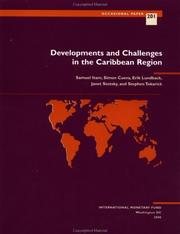
ISBN: 1557759502 1462385508 1452793379 9781557759504 Year: 2000 Volume: 201 Publisher: Washington, D.C. : International Monetary Fund,
Abstract | Keywords | Export | Availability | Bookmark
 Loading...
Loading...Choose an application
- Reference Manager
- EndNote
- RefWorks (Direct export to RefWorks)
This paper focuses on the independent states that are full members of the Caribbean Community. It provides background information on recent developments in the Caribbean region and lays out the principal policy issues that countries will need to address in the period ahead. The Caribbean countries face several common problems and must deal with similar economic policy issues. Consequently, concentrating on the regional perspective permits a comparison of the individual responses to similar problems. The regional view throws light on the countries' movement toward convergence. The economic prospects for the region are generally satisfactory over the medium term, but the projections depend importantly on the resolve of governments to pursue appropriate policies, as well as favorable developments in the rest of the world. The relatively favorable outlook for the region is not without risks, such as a slowdown in growth in the major trading partner countries or a term of trade shock.
Economic conditions. Economic development --- International finance --- International economic relations --- Caribbean Area --- Economic conditions --- Economic policy --- economie --- ontwikkelingsbeleid --- 338 <8> --- amerique latine --- developpement economique --- politique economique --- Free trade --- -Fiscal policy --- -Monetary policy --- -Foreign exchange rates --- -330.05 --- 330.9729 --- Exchange rates --- Fixed exchange rates --- Flexible exchange rates --- Floating exchange rates --- Fluctuating exchange rates --- Foreign exchange --- Rates of exchange --- Monetary management --- Currency boards --- Money supply --- Tax policy --- Taxation --- Finance, Public --- Free trade and protection --- Trade, Free --- Trade liberalization --- International trade --- Economische situatie. Economische structuur van bepaalde landen en gebieden. Economische geografie. Economische produktie.economische produkten. Economische diensten--Zuid-Amerika --- latijns amerika --- economische ontwikkeling --- economisch beleid --- Rates --- Government policy --- -Caribbean Area --- -Caribbean Free Trade Association countries --- Caribbean Region --- Caribbean Sea Region --- West Indies Region --- Commerce --- -Economic integration --- Economic policy. --- -Commerce --- 338 <8> Economische situatie. Economische structuur van bepaalde landen en gebieden. Economische geografie. Economische produktie.economische produkten. Economische diensten--Zuid-Amerika --- 330.05 --- Caribbean area --- Caribische Staten --- Caribbean Area - Economic conditions - 1945 --- -Caribbean Area - Economic policy --- Exports and Imports --- Inflation --- Investments: General --- Macroeconomics --- International Economics --- Trade: General --- Trade Policy --- International Trade Organizations --- Public Enterprises --- Public-Private Enterprises --- Price Level --- Deflation --- General Financial Markets: General (includes Measurement and Data) --- International economics --- Civil service & public sector --- Public finance & taxation --- International trade & commerce --- Exports --- Imports --- Public sector --- Trade facilitation --- Economic sectors --- Revenue administration --- Prices --- Customs administration --- Trinidad and Tobago
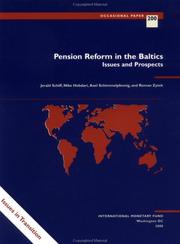
ISBN: 1462305792 1452715017 1557759685 9781557759689 Year: 2001 Volume: 200 Publisher: Washington, D.C. : International Monetary Fund,
Abstract | Keywords | Export | Availability | Bookmark
 Loading...
Loading...Choose an application
- Reference Manager
- EndNote
- RefWorks (Direct export to RefWorks)
This paper provides an overview of efforts in the Baltic countries to reform their pension systems, and examines the choices facing these countries in their continued reform efforts. Early reforms were aimed at correcting the flaws of the inherited Soviet system and, in particular, at shoring up the finances of the pension systems and reducing their distortionary impact. The Baltic countries have been in the forefront of transition economies in their pursuit of pension reform. They have taken important steps to shore up the long-run financial health of their existing pension funds and made preparations for the implementation of a three-pillar scheme. Although a move toward a fully funded pension system can potentially make an important contribution to the objectives of pension reform, such a change is neither necessary nor sufficient to meet these goals. The existing PAYG pension system can, at least in theory, be made sustainable by an appropriate adjustment of payroll tax rates and expected lifetime pension benefits, although the average replacement rate implied by such changes may well be fairly low, reflecting the expected demographic developments.
Baltic Area --- Baltic States --- Balkanlanden --- pays balkaniques --- politique gouvernementale --- 331.25209479 --- Retirement pensions --- Superannuation --- Retirement income --- Annuities --- Social security individual investment accounts --- Vested benefits --- balkanlanden --- overheidsbeleid --- -Baltic Republics --- Baltics (States) --- Social security law --- Pensions --- Social policy --- Social policy. --- 330.05 --- assurances --- pension --- pensioenen --- Compensation --- Pension plans --- verzekeringen --- pensioen --- Baltic Republics --- Pensions - Baltic States --- Baltic States - Social policy --- Exports and Imports --- Labor --- Macroeconomics --- Public Finance --- Demography --- Social Security and Public Pensions --- Nonwage Labor Costs and Benefits --- Private Pensions --- Economics of the Elderly --- Economics of the Handicapped --- Non-labor Market Discrimination --- Retirement --- Retirement Policies --- Wages, Compensation, and Labor Costs: General --- Labour --- income economics --- Population & demography --- Public finance & taxation --- International economics --- Pension spending --- Pension reform --- Aging --- Expenditure --- Population and demographics --- Population aging --- Wages --- Labor economics --- Latvia, Republic of
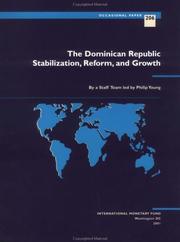
ISBN: 1462338089 1452727791 1589060466 9781589060463 Year: 2002 Volume: 206 Publisher: Washington, D.C. : International Monetary Fund,
Abstract | Keywords | Export | Availability | Bookmark
 Loading...
Loading...Choose an application
- Reference Manager
- EndNote
- RefWorks (Direct export to RefWorks)
This paper summarizes the authorities’ stabilization efforts, how these efforts were subsequently reinforced by certain key structural reforms, and other related developments that help explain the remarkable performance of the Dominican Republic’s economy in the 1990s during which the country achieved one of the highest output growth rates in Latin America, combined with low inflation, and a much improved external debt profile. The authorities often resorted to external arrears as a means of financing the external current account deficits of the 1980s. Although rescheduling agreements were reached with the international banking community and with the Paris Club of official creditors in the mid-1980s, they met with limited success until the authorities embarked on their stabilization program of the early 1990s. Large and persistent fiscal deficits represented a significant burden for monetary policy. Although at the beginning of the decade more than half of the public deficit was financed by foreign loans, episodes of default on external and domestic government debt led to a progressive drying up of these sources of financing.
Dominican Republic --- economische indicatoren --- hervorming --- amerique latine --- 338.97293 --- latijns amerika --- Economic policy and planning (general) --- Economic conditions --- Economic policy --- Economic policy. --- 330.05 --- croissance economique --- politique economique --- situation economique --- economisch beleid --- monetair beleid --- economische groei --- economische toestand --- Dominican Republic - Economic conditions - 1961 --- -Dominican Republic - Economic policy --- Exports and Imports --- Money and Monetary Policy --- Public Finance --- Taxation --- Production and Operations Management --- International Lending and Debt Problems --- Taxation, Subsidies, and Revenue: General --- Monetary Policy, Central Banking, and the Supply of Money and Credit: General --- Trade Policy --- International Trade Organizations --- National Government Expenditures and Related Policies: Infrastructures --- Other Public Investment and Capital Stock --- Investment --- Capital --- Intangible Capital --- Capacity --- Public finance & taxation --- International economics --- Macroeconomics --- Monetary economics --- Banking --- Revenue administration --- Tariffs --- External debt --- Arrears --- Public investment and public-private partnerships (PPP) --- Taxes --- Public sector --- Economic sectors --- Debts, External --- Revenue --- Industrial productivity --- Money supply --- Tariff
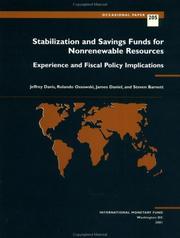
ISBN: 1589060199 1462319920 1452725772 9781589060197 Year: 2001 Volume: 205 Publisher: Washington, D.C. : International Monetary Fund,
Abstract | Keywords | Export | Availability | Bookmark
 Loading...
Loading...Choose an application
- Reference Manager
- EndNote
- RefWorks (Direct export to RefWorks)
This chapter examines whether funds can help countries pursue good macroeconomic, and especially fiscal policies, and consequent design issues. Nonrenewable resource funds (NRF) have been suggested as a way of dealing with the effects of price variability, making it easier to put revenues aside when prices are high so that they can be made available to maintain expenditures when prices are low. Funds may also serve as mechanisms to allow part of the nonrenewable resource wealth to be shared by future generations. A detailed evaluation of country experience suggests that NRFs have been associated with a variety of operating rules and fiscal policy experience. In several cases, rules have been bypassed or changed and they do not themselves seem to have effectively constrained spending, and the integration of the fund's operations with overall fiscal policy has often proven problematic. Whether the political economy arguments for an NRF outweigh the potential disadvantages will need to be considered based on the situation in each country.
Money. Monetary policy --- Public finance --- Appropriations and expenditures --- Finance, Public --- Sustainable development --- Nonrenewable natural resources --- Fiscal policy --- Finance --- -Fiscal policy --- beleid --- natuurlijke rijkdommen --- 336.2 --- investissements --- developpement durable --- richesses naturelles --- politique fiscale --- AA* / International - Internationaal --- 338.013 --- 331.31 --- 336.61 --- 336.030 --- 330.05 --- 333.7 --- Development, Sustainable --- Ecologically sustainable development --- Economic development, Sustainable --- Economic sustainability --- ESD (Ecologically sustainable development) --- Smart growth --- Sustainable economic development --- Economic development --- Cameralistics --- Currency question --- Tax policy --- Taxation --- Economic policy --- Non-renewable natural resources --- Exhaustible resources --- Natural resources, Nonrenewable --- Natural resources --- Belastingsakkoorden. Belastingswezen --- investeringen --- duurzame ontwikkeling --- fiscaal beleid --- Belang, verdeling en beleid van de natuurlijke rijkdommen. Grondstoffen. --- Economisch beleid. --- Financieel beleid. --- Overheidsinkomsten. Belang, verdeling en evolutie. Begrotingsinkomsten: algemeenheden. --- Environmental aspects --- Government policy --- Economic aspects --- Working papers --- Fiscal policy. --- Sustainable development. --- Finance. --- Finance, Public. --- 336.2 Belastingen. Belastingswezen. Openbare financien. Belastingspolitiek. Belastingstheorie. Belastingsharmonisatie. Fiskale politiek. Belastingsleer. Belastingsdruk. Belastingstechniek. Belastingsstelsel.Belastingstarief --- 336.2 Belastingsakkoorden. Belastingswezen --- Belastingen. Belastingswezen. Openbare financien. Belastingspolitiek. Belastingstheorie. Belastingsharmonisatie. Fiskale politiek. Belastingsleer. Belastingsdruk. Belastingstechniek. Belastingsstelsel.Belastingstarief --- Economisch beleid --- Overheidsinkomsten. Belang, verdeling en evolutie. Begrotingsinkomsten: algemeenheden --- Financieel beleid --- Belang, verdeling en beleid van de natuurlijke rijkdommen. Grondstoffen --- Public finances --- Nonrenewable natural resources - Finance --- Budgeting --- Exports and Imports --- Macroeconomics --- Public Finance --- Natural Resources --- National Government Expenditures and Related Policies: General --- Fiscal Policy --- Nonrenewable Resources and Conservation: General --- National Budget --- Budget Systems --- Energy: Demand and Supply --- Prices --- Public finance & taxation --- Environmental management --- Budgeting & financial management --- International economics --- Expenditure --- Non-renewable resources --- Budget planning and preparation --- Oil prices --- Environment --- Public financial management (PFM) --- Expenditures, Public --- Budget --- Papua New Guinea
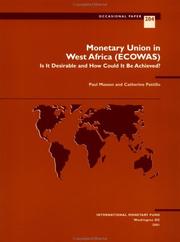
ISBN: 1589060148 1462350194 1452723753 9781589060142 Year: 2001 Volume: 204 Publisher: Washington (D.C.): International monetary fund,
Abstract | Keywords | Export | Availability | Bookmark
 Loading...
Loading...Choose an application
- Reference Manager
- EndNote
- RefWorks (Direct export to RefWorks)
This chapter evaluates whether a monetary union makes economic sense and discusses the institutional requirements for a successful Monetary Union in West Africa (ECOWAS). The chapter considers how best the political momentum for a union can be channeled toward a fundamental improvement in underlying policies. The paper also reviews the economic situation of the ECOWAS members, with the objective of evaluating the ease with which they can proceed to a common currency. Regional integration resulting in greater trade among ECOWAS countries may help increase efficiency of production. Trade among developing countries, in general, is likely to have fewer efficiency benefits than trade with developed countries, however, because the possibilities of exploiting complementarities are less. The foregoing considerations suggest that the momentum in favor of monetary union should be channelled into the crucial first phase of enhanced mutual surveillance and emphasis on each country improving its macroeconomic and structural policies. Success in this endeavor would in and of itself help to increase exchange rate stability.
International finance --- International Monetary Fund --- West Africa --- Monetary unions --- Economic Community of West African States --- Africa, West --- Economic integration --- Afrika --- monetair beleid --- 339.92 <6> --- -afrique --- pays en voie de developpement --- union monetaire --- 333.431 --- AFR / Africa - Afrika - Afrique --- 330.05 --- 332.4966 --- Common currencies --- Currency areas --- Currency unions --- Optimum currency areas --- Currency question --- Money --- Economische samenwerking en integratie. Tolunie--Afrika --- afrika --- ontwikkelingslanden --- monetaire unie --- Monetaire Unies. --- C.E.D.E.A.O. --- CEDEAO --- Communauté économique des Etats de l'Afrique de l'Ouest --- Comunidade Económica dos Estados da África do Oeste --- Comunidade Económica dos Estados da África Ocidental --- E.C.O.W.A.S. --- ECOWAS --- Africa, Western --- Western Africa --- Economic integration. --- Working papers --- Economic Community of West African States. --- 339.92 <6> Economische samenwerking en integratie. Tolunie--Afrika --- afrique --- Monetaire Unies --- Monetary unions - Africa, West --- Africa, West - Economic integration --- Banks and Banking --- Exports and Imports --- Foreign Exchange --- Money and Monetary Policy --- Industries: Manufacturing --- Agribusiness --- Financial Aspects of Economic Integration --- Monetary Systems --- Standards --- Regimes --- Government and the Monetary System --- Payment Systems --- Empirical Studies of Trade --- Banks --- Depository Institutions --- Micro Finance Institutions --- Mortgages --- Industry Studies: Manufacturing: General --- International economics --- Currency --- Foreign exchange --- Monetary economics --- Banking --- Manufacturing industries --- Agricultural economics --- Currencies --- Exchange rates --- Terms of trade --- Real effective exchange rates --- International trade --- Economic policy --- nternational cooperation --- Banks and banking --- Nigeria
Book
ISBN: 1589060474 1462317901 1452752001 9781589060470 Year: 2001 Volume: 207 Publisher: Washington, D.C. : International Monetary Fund,
Abstract | Keywords | Export | Availability | Bookmark
 Loading...
Loading...Choose an application
- Reference Manager
- EndNote
- RefWorks (Direct export to RefWorks)
This paper discusses how Malaysia can better protect itself from future shocks and avoid another crisis while it seeks to regain its position as one of the fastest growing economies in the world. To these ends, its strategy should include continued structural reforms to achieve healthy balance sheets of the banking and corporate sectors; further deregulation to promote competition and efficiency; and consistent macroeconomic policies to maintain financial stability and sustainable fiscal and external positions. Malaysia's economic structure and performance were relatively strong prior to the crisis. Malaysia’s initial low level of short-term external debt enabled it to maintain foreign reserves at a reasonably high level, and this contributed to relatively robust external and domestic confidence early on in the crisis. As a consequence of financial vigilance exercised through prudential regulation of capital movements, the exposure of the financial and corporate systems was contained. Stock market capitalization in Malaysia grew to an extremely high level prior to the crisis, reflecting both the fast expansion of the capital market and liberal capital account regime.
Economic policy and planning (general) --- Malaysia --- monetair beleid --- ontwikkelingsplan --- ontwikkelingsbeleid --- 338 <595.11> --- asie --- financement --- politique fiscale --- politique monetaire --- societes --- structure economique --- Fiscal policy --- -Finance --- -MY / Malaysia - Maleisië - Malaisie --- 331.31 --- 330.05 --- 330.9595 --- Funding --- Funds --- Economics --- Currency question --- Tax policy --- Taxation --- Economic policy --- Finance, Public --- Economische situatie. Economische structuur van bepaalde landen en gebieden. Economische geografie. Economische produktie.economische produkten. Economische diensten--Maleisië --- azie --- financiering --- fiscaal beleid --- vennootschappen --- economische structuur --- Economisch beleid. --- Government policy --- Economic conditions. --- Economic policy. --- Working papers --- Economisch beleid: Maleisië --- Economische landenstudies: Maleisië --- Fiscaal beleid: Maleisië --- Economisch beleid: Maleisië. --- Economische landenstudies: Maleisië. --- Fiscaal beleid: Maleisië. --- 338 <595.11> Economische situatie. Economische structuur van bepaalde landen en gebieden. Economische geografie. Economische produktie.economische produkten. Economische diensten--Maleisië --- Economisch beleid --- -Malaysia --- Banks and Banking --- Corporate Finance --- Exports and Imports --- Public Finance --- Industries: Financial Services --- Finance: General --- Banks --- Depository Institutions --- Micro Finance Institutions --- Mortgages --- International Investment --- Long-term Capital Movements --- Fiscal Policy --- Corporate Finance and Governance: General --- Macroeconomics: Production --- Finance --- Macroeconomics --- Banking --- Ownership & organization of enterprises --- International economics --- Monetary economics --- Corporate sector --- Capital controls --- Nonperforming loans --- Financial institutions --- Balance of payments --- Economic sectors --- Corporate governance --- Banks and banking --- Business enterprises --- Capital movements --- Loans --- Production --- Economic theory
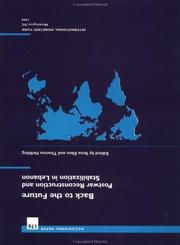
ISBN: 1557757844 1462300758 1452759065 Year: 1999 Publisher: Washington, D.C. : International Monetary Fund,
Abstract | Keywords | Export | Availability | Bookmark
 Loading...
Loading...Choose an application
- Reference Manager
- EndNote
- RefWorks (Direct export to RefWorks)
Following the 15-year civil war that started in 1975, Lebanon's government began the difficult task of economic stabilization and confidence building, on the one hand, and postwar reconstruction and development, on the other. The government led the reconstruction effort by formulating programs that aimed to rapidly rehabilitate the country's severly damaged infrastructure in preparation for private-sector-led growth over the medium term. At the same time, Lebanon introduced an exchange-rate-based nominal anchor policy to stabilize expectations and cut inflation. This paper analyzes the government's progress with the policies adopted.
Economic policy and planning (general) --- Lebanon --- European Union --- dette publique --- finances publiques --- liban --- politique economique --- politique fiscale --- situation economique --- taux d'interet --- Reconstruction --- -Economic stabilization --- -Finance, Public --- -Fiscal policy --- -Interest rates --- -Debts, Public --- -330.05 --- 330.95692 --- Debts, Government --- Government debts --- National debts --- Public debt --- Public debts --- Sovereign debt --- Debt --- Bonds --- Deficit financing --- Money market rates --- Rate of interest --- Rates, Interest --- Interest --- Tax policy --- Taxation --- Economic policy --- Finance, Public --- Cameralistics --- Public finance --- Currency question --- Adjustment, Economic --- Business stabilization --- Economic adjustment --- Stabilization, Economic --- openbare schuld --- openbare financien --- libanon --- economisch beleid --- fiscaal beleid --- economische toestand --- rentevoeten --- Government policy --- Economic policy. --- Economic conditions --- -Statistics. --- Debts, Public --- Economic stabilization --- Fiscal policy --- Interest rates --- 330.05 --- E.U. --- Public finances --- Liban --- République libanaise --- Libanon --- Lubnān --- Libanan --- Livan --- Mont-Liban (Turkey : Mutaṣarrifīyah) --- Jabal Lubnān (Turkey : Mutaṣarrifīyah) --- Levanon --- Líbano --- Livanos --- Grand Lebanon --- Grand Liban --- Lebanese Republic --- Jumhūrīyah al Lubnānīyah --- Jumhouriya al-Lubnaniya --- Republic of Lebanon --- لبنان --- جمهورية اللبنانية --- Ліван --- Ліванская Рэспубліка --- Livanskai︠a︡ Rėspublika --- Ливан --- Република Ливан --- Republika Livan --- Λίβανος --- Δημοκρατία του Λιβάνου --- Dēmokratia tou Livanou --- Jumhūrīyyah al-Lubnānīyyah --- 레바논 --- לבנון --- רפובליקה הלבנונית --- Republiḳah ha-Levanonit --- Либан --- Либанска Република --- Libanska Republika --- レバノン --- Rebanon --- レバノン共和国 --- Rebanon Kyōwakoku --- Ливанская Республика --- Республіка Ліван --- Respublika Livan --- Ліванська Республика --- Livansʹka Respublyka --- Levonen --- 黎巴嫩 --- Libanen --- Banks and Banking --- Exports and Imports --- Investments: General --- Macroeconomics --- Public Finance --- Debt Management --- Sovereign Debt --- General Financial Markets: General (includes Measurement and Data) --- Taxation, Subsidies, and Revenue: General --- Trade: General --- Banks --- Depository Institutions --- Micro Finance Institutions --- Mortgages --- National Government Expenditures and Related Policies: General --- Public finance & taxation --- International economics --- Investment & securities --- Banking --- Finance --- Treasury bills and bonds --- Revenue administration --- Expenditure --- Government debt management --- Financial institutions --- Public financial management (PFM) --- Government securities --- Revenue --- Expenditures, Public --- Banks and banking
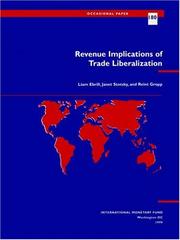
ISBN: 1557758131 1462304796 1452703574 9781557758132 Year: 1999 Volume: 180 Publisher: Washington, D.C. : International Monetary Fund,
Abstract | Keywords | Export | Availability | Bookmark
 Loading...
Loading...Choose an application
- Reference Manager
- EndNote
- RefWorks (Direct export to RefWorks)
The apparent contradiction between trade liberalization and continuing high trade tax revenue raises the important question of how, precisely, the one affects the other. Although policymakers generally recognize the long-term benefits of trade liberalization, some have argued for at least a slower pace, in part because of revenue concerns. This paper seeks to address these issues in three complimentary ways: through an overview of the factors that may have a bearing on the question, through a review of trends in trade tax revenue both globally and in selected countries, and through econometric analysis.
Foreign trade policy --- Free trade --- International trade --- Revenue --- Econometric models --- -Free trade --- -International trade --- -economie --- concurrentie --- internationale handel --- 330.56 --- 339.9 --- 330.115.001.57 --- commerce mondial --- economie de marche libre --- concurrence --- revenus --- politique fiscale --- tarifs fiscaux --- modeles economiques --- AR / Argentina - Argentinië - Argentine --- MA / Morocco - Marokko - Maroc --- MW / Malawi --- PH / Philippines - Filippijnen - Philippines --- PL / Poland - Polen - Pologne --- SN / Senegal --- 382.51 --- 305.92 --- 336.032 --- 382.33 --- 330.05 --- 336.02 --- External trade --- Foreign commerce --- Foreign trade --- Global commerce --- Global trade --- Trade, International --- World trade --- Commerce --- International economic relations --- Non-traded goods --- Free trade and protection --- Trade, Free --- Trade liberalization --- Government revenue --- Public revenue --- Finance, Public --- Taxation --- Nationaal inkomen. Volksinkomen. Gezinsinkomen. Vermogensstratificatie. Particuliere inkomens en bestedingen. Armoede. Honger --- Buitenlandse economische betrekkingen. Internationale economische betrekkingen --- Econometrische modellen. Simulatiemodellen --- wereldhandel --- vrije markteconomie --- inkomens --- fiscaal beleid --- belastingtarieven --- economische modellen --- Aard, belang en evolutie. Handelsbalans. J curve. --- Econometrie van de internationale handel. Handelsbalans, betalingsbalans. Wissel. --- Taksen en belastingen. Fiscale en niet-fiscaleontvangsten. --- Vrijhandel. --- Working papers --- Econometric models. --- 330.115.001.57 Econometrische modellen. Simulatiemodellen --- 339.9 Buitenlandse economische betrekkingen. Internationale economische betrekkingen --- 330.56 Nationaal inkomen. Volksinkomen. Gezinsinkomen. Vermogensstratificatie. Particuliere inkomens en bestedingen. Armoede. Honger --- economie --- Econometrie van de internationale handel. Handelsbalans, betalingsbalans. Wissel --- Taksen en belastingen. Fiscale en niet-fiscaleontvangsten --- Vrijhandel --- Aard, belang en evolutie. Handelsbalans. J curve --- Free trade - Econometric models --- International trade - Econometric models --- Revenue - Econometric models --- Exports and Imports --- Public Finance --- Trade Policy --- International Trade Organizations --- Trade: General --- Taxation, Subsidies, and Revenue: General --- Public finance & taxation --- International economics --- Tariffs --- Taxes on trade --- Imports --- Revenue administration --- Taxes --- Tariff --- Commercial policy --- Morocco
| Listing 1 - 10 of 13 | << page >> |
Sort by
|

 Search
Search Feedback
Feedback About
About Help
Help News
News